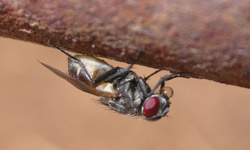
In the News
| More news |
June 19, 2007
Why did the chicken cross the road? —To escape deadly exotic disease
Laboratory testing shows that flies exposed to a food source infected with exotic Newcastle disease (END) can pick up the virus and carry it for several days, perhaps later passing it on to chickens that eat it.
 |
|
Resting house fly |
“We can’t say that flies are proven to transmit END virus to chickens; only that flies can carry END virus and that evidence is mounting that flies may be able to transmit the virus between chickens,” says assistant veterinary entomologist Alec Gerry from University of California Riverside. Gerry, along with UC Cooperative Extension associate veterinarian Carol Cardona, recently examined the role that flies might play in transmitting this virus between poultry.
END is a contagious and fatal viral disease affecting the respiratory, nervous, and digestive systems of poultry and other birds. “END is so infectious that many birds die without ever showing signs of illness,” says Gerry, “Even poultry vaccinated against low virulence Newcastle disease virus strains are not adequately protected against the virus.”
In 2002 and 2003, an END outbreak in California resulted in quarantine of nearly 20,000 buildings, the destruction of 3.2 million birds, and eradication efforts that cost $170 million, says Gerry.
“Backyard poultry are geographically clumped in southern California with small numbers of poultry at many adjacent homes with only a few feet separating poultry at one home from the next,” he says. “During the 2002 and 2003 outbreak, homes that had poultry infected with exotic Newcastle disease virus were often in very close proximity.”
END is primarily spread by direct contact between infected and healthy birds. However, it can also be transmitted indirectly via contaminated equipment and people.
Seemanti Chakrabarti, a post-doctoral associate working for Gerry, found that flies (bronze blow fly, housefly, and little house fly) routinely contract infectious END virus at locations where chickens are infected with the virus. Presumably, flies are making contact with the virus when they land or feed on poultry manure containing the virus.
Wet manure is an excellent breeding ground for several fly species and also likely supports the survival of END virus. Flies are capable of harboring a diverse range of animal and human viruses and may transmit these pathogens to otherwise healthy hosts.
“Conservatively, flies should be considered as transmitters of the END virus,” says Gerry. “This means that fly control should be an important part of a biosecurity program at all poultry operations.“
Also, if END is found at a poultry facility, state and federal authorities responsible for quarantine and disinfection of premises infected with the virus should control adult flies before and during the period when manure is being removed from the infected site. Failure to control the adult flies could lead to poultry infections in other nearby facilities.
University of California Exotic/Invasive Pests and Diseases Research Program and USDA Hatch Funds supported this research project.
For more information about this and other research on exotic pests and pathogens, visit ipm.ucanr.edu.
The UC Exotic/Invasive Pests and Diseases Research Program targets research on exotic pests and diseases in California. The program aims not only to improve our knowledge and management of pests that are already here, but also to reduce the potential impact of those pests and diseases that pose a threat to the state. The program is a collaboration between the UC Statewide Integrated Pest Management Program and the UC Riverside Center for Invasive Species Research. U.S. Department of Agriculture, Cooperative State Research Education and Extension Service, funds the program.
Resources
High-resolution image (488KB) "Resting house fly." Photo credit: Courtesy of UC Statewide IPM Program, by Alec Gerry.
High-resolution image (456KB) "Post-doctoral researcher Seemanti Chakrabarti collects flies from a commercial poultry operation in California." Photo credit: Courtesy of UC Statewide IPM Program, by Alec Gerry. Photos are for use with this release only. All other uses see Legal Notices.
Contacts
Stephanie Klunk, Communications Specialist
UC Statewide IPM Program
(530) 754-6724
Alec Gerry, Ph.D.
Assistant Veterinary Entomologist / Extension Specialist
University of California at Riverside
Department of Entomology
Riverside, CA 92521
(951) 827-7054 LAB